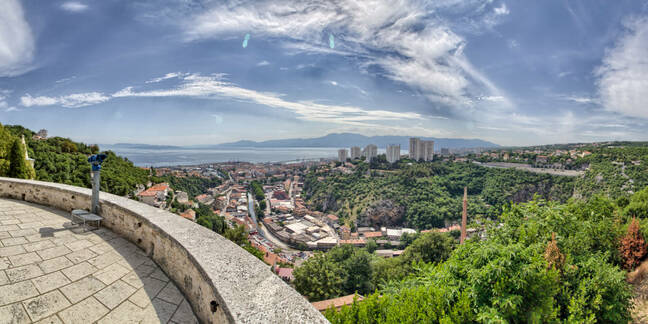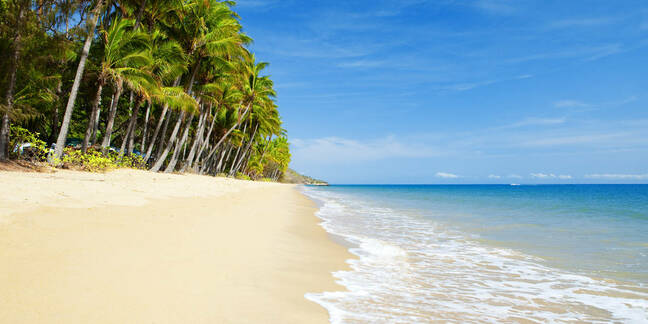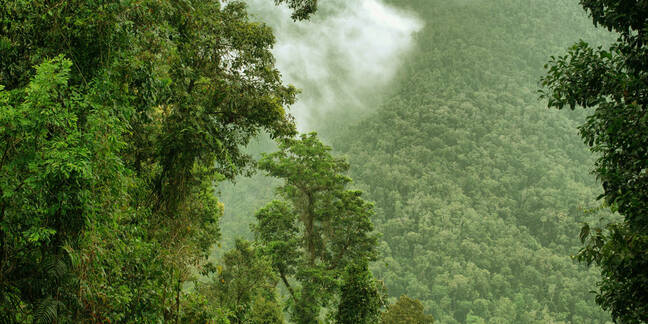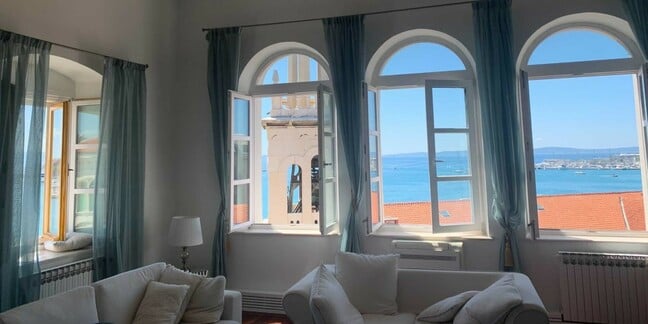This article is more than 1 year old
Some stayed in Croatian castles. Some hid in cars. We speak to techies who experienced lockdown in very different ways
Tales from less-conventional bunkers at the height of the pandemic
Covid Logfile II Darren Ellis spent eight weeks of 2020 quarantined in hotel rooms. James McParlane spent seven months of the year in a Croatian castle. Bruce Davie and Josh Odgers spent 111 days unable to travel more than five kilometres from home or spend more than an hour a day outside.
Claire O'Dwyer moved to a tropical paradise. And Chris Moriarty started hiding his kids in his car so they could get some exercise during another deep lockdown.
And while none were alone in finding themselves in new and unusual work situations due to COVID-19, their stories are surely some of 2020's most extreme remote work experiences.
Darren's story started in late February when he went to sea for what looked like a normal six-week stint in his role as chief navigator of a seismic exploration ship. "We tow a huge equipment array behind us, a part that makes a pressurised air bubble, and hydrophones that record the resulting pressure wave to map the seabed down to a good resolution," he told The Register.
And when Ellis says "huge" he's not exaggerating. The rig on this job was 10km long and 1,100m wide
Ellis's job is to make sure the right data makes it ashore for analysis in the hope that it identifies resources worth extracting. And in February 2020 he didn't think the trip would be too different to the others he's made in the decade since leaving a tech journalism career for life at sea.
He'd heard of coronavirus when he left Singapore. But he couldn't know that by the end of his six-week stint, the world would be talking about little else.
While Darren worked, James McParlane worried about his passport.
James's story started in late 2018 when the company he part-owned was acquired and his television broadcast and video streaming expertise was increasingly required in London, Denmark, and Prague. James calls Australia home but his shuttling around Europe saw him get close to time limits on his visas.
In early 2020 James needed a holiday and his passport needed some time to cool down outside of the UK and Schengen region.
"From early January I was in London and at that point I was the only one in the company saying this might be declared a pandemic," he recalled. "I was following the news since December and I would recite what I knew of the history and duration of the 'Spanish Flu', trying to discuss what we should plan for and everyone in the office was like, 'What is up with James?'"
By early February a conversation with a friend who works for one of the big three public clouds about its response to the developing situation proved decisive. To try and feel out what James's organisation was doing in preparation for The Plague, the cloud employee mentioned what he gleaned about possible best practice with someone who could set policy.
"I was told that everything was fine, nothing to worry about, but spotted them a few days later opening a door with their elbow."
With news of spreading coronavirus infections impossible to avoid, James began looking for somewhere relaxing, outside the Schengen zone, and with good healthcare. This was not going to be just a holiday, but a potential bolt hole or, worst case, a final destination.
"Governments were considering a policy of herd immunity. As a side project I play with an unfashionable branch of machine learning called genetic algorithms. I knew a large, infected population would mean more mutations, which would be bad. Also, their policies seemed to be predicated on being able to negotiate with the virus on where it would be allowed spread. It was time to get out of Dodge."
Their policies seemed to be predicated on being able to negotiate with the virus on where it would be allowed spread. It was time to get out of Dodge
At this point James started thinking about finding a safe and pleasant place to be stranded where he could continue working. Croatia fit the bill on the internet quality and immigration front and James discovered its health system was good enough that the nation has become something of a medical tourism destination.
"When I started travelling, I tried to stay at only one mid-range hotel chain that seemed to have the most generous points system," he told The Register. "Split happened to have one of their largest resort hotels and I knew I would be able to get upgraded to something large enough to make a long-term stay comfortable.
"I booked flights and the hotel, enjoyed two weeks in what I assumed to be pre-apocalypse London and then grabbed one of every bit of gear I needed to build a streaming and broadcast lab and legged it."
Twenty-four hours after arriving, safely ensconced in a resort hotel, a pandemic was officially declared by the World Health Organization and James's bagful of TV hardware meant he was the only one in his company with a full lab capable of doing meaningful work from "home".
Digging in down under
Josh Odgers started lockdown with a non-COVID medical problem: a torn anterior cruciate ligament (ACL) in his knee.
The ligament wasn't a major worry for Odgers, a Nutanix employee in Melbourne, Australia, where by late March residents had been told to work from home and gatherings were restricted. Even Australian football, a near-religion in the city, was shut down.
Odgers had felicitously opted out of surgery on his knee, instead choosing a stem cell treatment and supervised rehabilitation that meant he didn't need to visit Melbourne's restricted hospitals. His home is filled with workout gear he uses to pursue hobbies including jujitsu so he could keep his rehab moving along.

A memo from the distant future... June 2022: The boss decides working from home isn't the new normal after all
READ MOREWorking from home was easy, too, because he'd done it for years.
"90 per cent of what I do is sitting at my machine so for me working from home has always been a huge advantage," Odgers said. "At least half of my achievements can be attributed to it. In the early days of Nutanix, we had a serviced office as the façade. Even when I was at IBM, most of my meetings were Webex because even in a 20-storey building people could not be bothered actually going to meetings."
But Odgers is also very sociable and believes that productive remote work depends on first making a real-world connection.
"Face-to-face is valuable," he says. "Once you meet someone and know them, you have built that rapport and it is not as important to meet."
So before COVID-19, Odgers found himself on a plane almost every week.
But as April 2020 rolled around, Australia's internal borders closed and made even interstate travel impossible. Overseas travel required a permit – and an increasingly hard-to-find seat on a plane.
Josh was going to be in Melbourne for a while.
Uncertainty rises
At about the same time, Darren Ellis discovered he'd be stuck near India for a while because by now the virus was raging and he and his crew were not allowed to disembark at the planned end of their mission. Nor were new crew allowed to board.
To pass time, Ellis and his crew just kept working on their seabed survey. Food and fuel were brought aboard. Once the survey was finished, the crew started to fill the time with maintenance.
And waiting to hear if they'd ever be allowed ashore.
Back in Croatia, uncertainty caught up with James, too. Not long after the pandemic was declared in mid-March, tourism cratered and his hotel closed. Even his impressive platinum status and loyalty points balance was little use so he turned to Airbnb and found an apartment that occupied the top floor of a former castle. Haggling with the proprietor, who figured tenants would soon be hard to find, dropped the price substantially.
James had found his bolt hole – complete with good Wi-Fi, and fabulous views of a city so pretty that the Roman emperor Diocletian retired there in the 4th century AD.
"I woke up every morning to a wonderful view, it was an amazing, beautiful place," he told The Register. And while he didn't go out much other than to walk and swim for exercise while wearing a mask that sported scrolling LEDs advising social distancing by two meters, he rates his time in Split "the experience of a lifetime."
"I made a sport of judging the yachts of the various oligarchs that would sail in day and night. Croatia was very much in denial on the pandemic to try and save their tourist season so there was always a lot going on outside my windows, but I mostly stayed indoors in my gilded cage. I know I was very lucky and I was mentally born pandemic-ready.
"I've always been comfortable in my own company and I had the whole online world to interact with. I made friends with all the cats of Split and I kept a kind of 'Pandemic Diary Thread' on Twitter, which I am still continuing."
I’ve stumbled into executing a cunning plan in the time of Covid19. I had to stay out of UK and Schengen region for three weeks before April 5th. I decided to book three weeks in the off-season in an inconveniently located sea-side resort in Croatia.
— writer of strange software (@DrMiaow) March 11, 2020
There is almost nobody here. pic.twitter.com/Ovy5YtYitW
James was safe, productively occupied with both paid work and personal projects, and Netflix worked perfectly in his downtime.
Things were less pleasant for Darren Ellis as he was still floating off India. Six weeks of finding things to do had stretched to eight weeks. Then 10 weeks.
Nobody aboard was sick or displayed anything like the symptoms of COVID-19 because they'd all been separated from humanity for over 70 days.
Any port in a virus storm
"We were possibly the least-at-risk people in the world while we were on the ship," Ellis said. Yet it was still unclear when, where, or if they'd be allowed ashore.
In week 12 came a breakthrough: Gibraltar would accept the ship – on condition its crew were certified virus-free and went straight from the port onto a plane heading to anywhere else.
Transit time to Gibraltar was three weeks, which was how Ellis set foot on dry land 15 weeks after leaving Singapore.
But he couldn't go to Malaysia, where his partner lives. Malaysia had closed its borders to all others. As another Australian passport-holder, Ellis had to go home.
To his parents.
Doing so involved a long flight through Qatar, wearing a face mask.
And once he arrived in Melbourne, he was forced to quarantine in a hotel room for a fortnight to comply with Australian requirements.
"After 15 weeks on board a ship surrounded by crew working 12 hours a day, two weeks of solitude was fantastic," he said. "We are isolated at sea anyway so it is not that bad to just be locked up in a room for two weeks."
We are isolated at sea anyway so it is not that bad to just be locked up in a room for two weeks
But Ellis didn't know he'd be forced to spend another six weeks in hotels during 2020 alone. Or that he wouldn't see his partner again during the year.
And he had no inkling that he would eventually become part of the longest, hardest, most controversial coronavirus lockdown the world had seen.
Nor did Bruce Davie, the former Asia-Pacific chief technology officer at VMware and a resident of Melbourne – albeit one who spent a lot of time outside the city.
"I was pretty well known by flight crew on airlines between Australia and Singapore, Hong Kong and the USA," Davie told The Register. Now grounded, he found he missed incidental meetings with people as he travelled.
He also noticed that the quality of meetings he took improved.
"One of the things I find is that if you are visiting a place, the team will fill your day with meetings without a compelling event."
With travel out of the question and real-world meetings and marketing impossible, Davie's team put him to work.
"They used me more during lockdown than during other times," Davie said. "Because they didn't have the chance to put me in front of customers in person, they used me in a more targeted way."
Won't anyone think of the children?
In Manila, capital of the Philippines, Chris Moriarty was using his office in ways it had not been intended.
We met Chris in our first Covid Logfile when he shared his story of a four-hour pre-lockdown office move.
The Philippines extended that initial one-month lockdown. Then extended it again, and again. And one of its provisions across all those extensions was that children were not allowed outdoors.
For any reason.
For Moriarty's two sporty teens, this was a problem. The answer was to load the kids into the family car without being seen from outside the house, hide them in the back, then drive to his office where he hoped they could enter through the basement without attracting outside attention.
The office is a few tens of metres long so offered some space in which to roam, but the change of scenery was also welcome.
Darren Ellis also had a change of scenery. He'd left Melbourne, travelled to Brazil for work, and endured another two weeks of hotel in the South American nation before again going to sea.
When he returned home to Melbourne, there was trouble.
Poorly managed hotel quarantine saw the virus escape into the community. New cases grew from a handful each day to hundreds.
Contact-tracing efforts were overwhelmed and in early July a despairing state government ordered an indefinite Level Four lockdown. Residents were not permitted to leave their homes for more than an hour each day. Travel more than five kilometres from home was forbidden.
Darren came home just in time for another two weeks in a hotel room, thankfully in another more relaxed Australian city.
He still had a scare when health authorities managed to use the same needles in more than one patient during blood sugar tests, and called to let him know.
Apologies, more tests, and an eventual clearance made this quarantine period even tenser than usual.
In Melbourne, meanwhile, Bruce Davie had another challenge. A keen cyclist and trail runner, he was now mostly confined to quarters.
Davie was fortunate that he'd bought a stationary bike trainer some years back as they were nearly unavailable during lockdown. He was quick to sign up for a virtual training subscription service so was able to continue daily exercise through the long lockdown.
Productivity takes off without planes
He also started to notice that working from home meant having to use all his managerial and communications skills.
"Communicating with your team is something that takes constant effort and you just have to find ways to put that effort in a little differently when the standard modes of comms are not there," he said. "I really missed the chance to just meet people that I would have when traveling. I tried to recreate that with virtual beers or virtual coffees. But there was no substitute for those casual interactions."
I tried to recreate that with virtual beers or virtual coffees. But there was no substitute for those casual interactions
Davie also took satisfaction from having a big project to work on in the form of a major conference talk on quantum computing.
"I was able to get that done because I wasn't sitting on planes."
Josh Odgers was also finding the long lockdown helped him to be productive, partly by eliminating office politics.
"In an office you can spread nonsense," he said. "It is harder to spread negative effects of office life online."
Odgers thinks he and colleagues became more focussed, and found they had more time now that entertaining clients was not possible.
"The sales cycle in some regards became shorter because we can meet more often and more easily," he said. Internal efforts also became easier. "I felt like at certain times our focus was in the wrong areas... we have swung back in the directions we wanted to go," he said.
Truly strong performers stood out, he said, and the team rallied around them.
Tropical escape
While Melbourne endured its long lockdown, Claire O'Dwyer was able to take a trip to Australia's tropical north.
A specialist in recruiting and placing skilled VMware talent, she's the only person with that skillset in her company and has therefore been able to work from home for years because she's not a member of wider teams.
And as she states with characteristic candour, she's not comfortable in the office because "I often have loud and confidential conversations."
During lockdown, O'Dwyer exceeded her financial targets and even topped her pre-plague performance. So when lockdown eased enough for her to take a break in the nation's tropical north, she jumped at the chance.
And while she was there, Claire bought a house and decided to relocate.
"My partner and I thought 'Why the bloody hell not?'" she said.
Her employer said the same thing.
"He said, 'To be fair you could have probably lived there for the last two years.' But I don't think I would have had that answer a year ago – COVID changed attitudes."
Claire's now planning a lifestyle change, without a job change.
"I was able to take advantage of the crisis and make it work for me," she said.
The end of the beginning
Back in Croatia, meanwhile, James had decided to return to London. New attachments formed in his long exile gave him a better chance of sorting out his immigration status and made the UK capital the right place to be.
"I feel guilty about having the working holiday of a lifetime while many others suffered," he said. "I don't know how to reconcile that. I did what I could. I wanted to help friends who were having a bad time mentally so when the Croatian summer tourist season restarted and risks started to seem to be known and manageable I put out feelers to friends in Europe that could still travel to come and visit."
Darren Ellis, meanwhile, just wanted to go home. After Victoria's long lockdown ended he'd been able to visit his parents, but another flight to Brazil beckoned, along with another term of quarantine.
"It is depressing but there is no point being depressed because there is absolutely nothing I can do," he said.
"I found it very difficult, but when I talk to my wife, I am grateful that no matter how much it all sucks, I still have a job, which I should be thankful for the way things are going."
Darren spent Christmas and New Year's Eve at sea. Then returned to quarantine as the pandemic soared towards a new peak in Brazil.
As the first anniversary of the Philippines lockdown rolled around in March 2021, Chris Moriarty bought a new car.
"I went for the biggest car with the darkest tinting I could buy," he said. "It is the sort of car that all the politicians here would use."
The reason that look mattered was that moving through Manila still meant passing police checkpoints, of which there were plenty between Moriarty's home and the nearest golf course.
"Golf was the first sport they made legal again in lockdown," he explained. But with the nearest course an hour away, an investment in a faster trip made sense.
"We now play three times a week," he said. And that big black car means his kids can sometimes make it to the links too.
Despite the long lockdown, he and his family are in fine form.

How big might IT spending get in 2021? Gartner: How about $4 trillion. And no, you can't have a new MacBook
READ MORE"The amount of alcohol we are consuming is significantly reduced. We go to bed early and get up early and I'm doing things I never had time to do before."
"I'm really working hard on the business, building processes and systems I never had time to do before," he said.
"I am so glad I did not go home due to the pandemic. Just about everyone who owns a business like Flat Planet is not here, but there are businesses falling over left, right and centre."
"I am spending time improving the business. The fact that the Moriarty family are still here is an advantage. 2020 was one of our best years ever and 2021 is off to a cracking start."
And while Moriarty acknowledges the year has been hard on his children – probably in ways that are yet to be felt – at least they didn't go through a long COVID exile apart.
"We are here as a family and we're all in it together."
And so, in many ways, are we all. ®
The Register is planning a series of Covid Logfile stories that, hopefully, offer a first draft of 2020 history from the perspective of the IT community. If you'd like your experience to be considered, we're looking for:
- Stories of being laid off due to the pandemic, and the process of finding a new gig during an economic crash
- Experiences of adopting collaboration tools, from both technical and cultural viewpoints
- Home office setups and how they evolved. The odder the better!
To share your story, mail us here.





